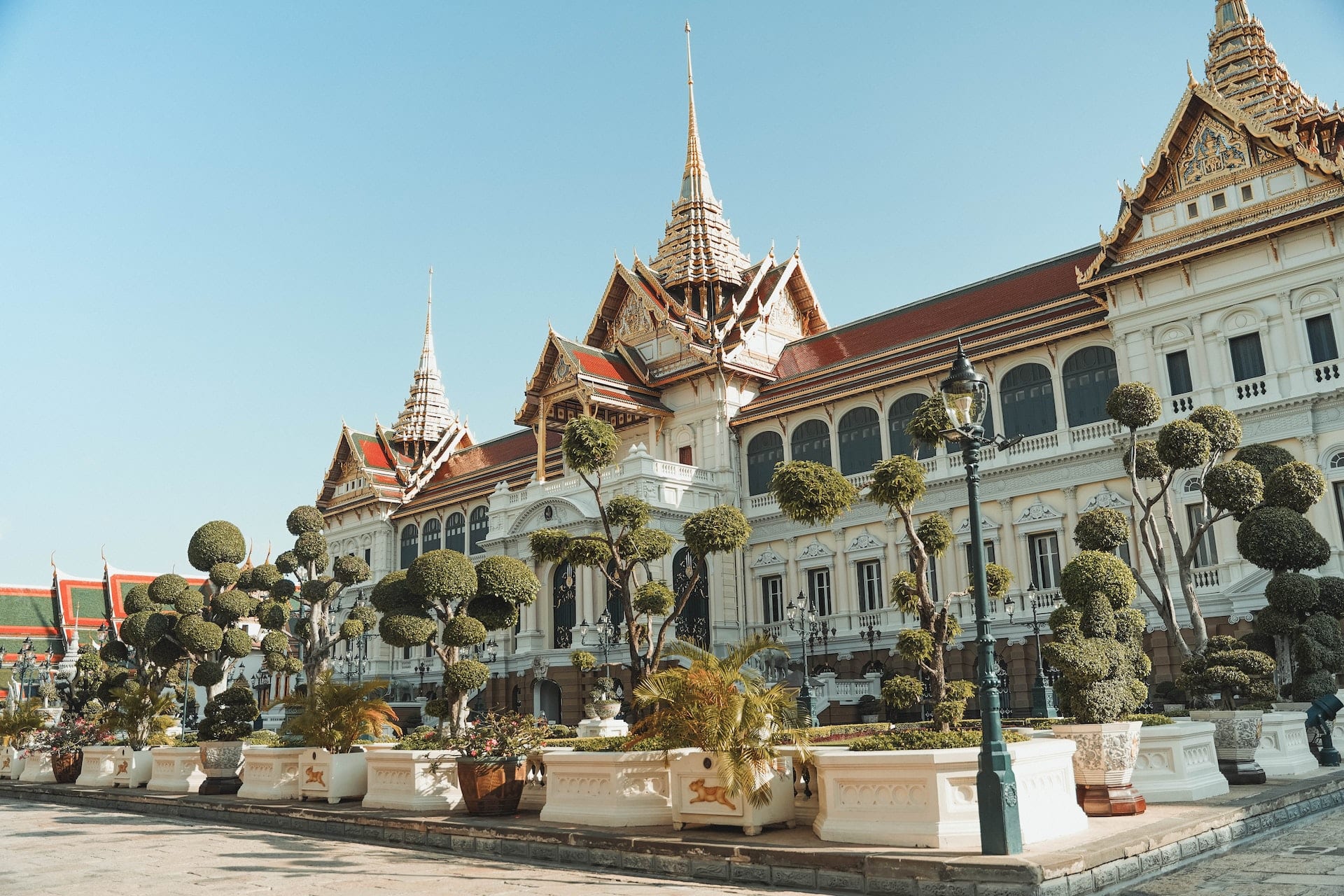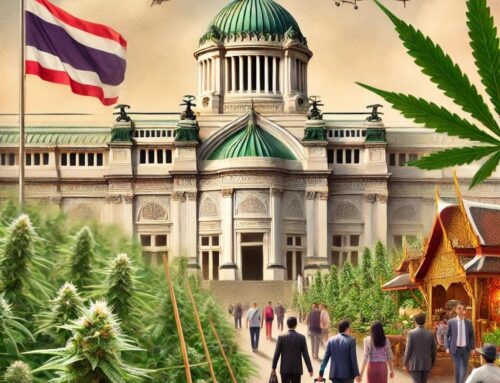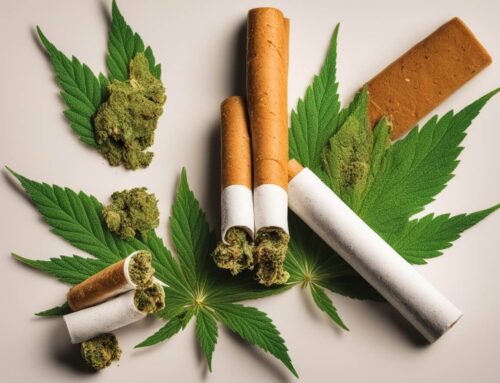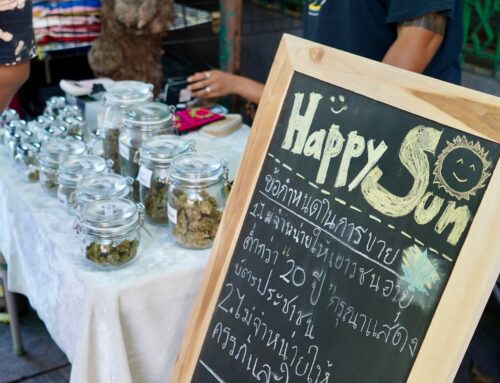Does Thailand have a chance of becoming the Amsterdam of Asia? In a landmark move, the Thai government removed cannabis from the narcotics list, so citizens can grow cannabis plants at home, and restaurants can serve cannabis-infused dishes. Nevertheless, there are still many grey areas to consider when it comes to the law. So is Cannabis Legal in Thailand?
When you think of Thailand, ancient temples, scenic views and delicious food may first come to mind. However, on June 9th, 2022 the Thai government made history becoming the first in Asia to decriminalise cannabis. As if that wasn’t remarkable enough, they distributed a million marijuana plants to celebrate the epoch-making event! Additionally, those incarcerated due to cannabis-related crimes had their sentences overturned.
As far as cannabis policy is concerned, this move seems unreal—almost bizarre—and sets Thailand apart from most countries. The catchy headlines and bombastic claims surrounding this momentous occasion have some looking at Thailand as a weed-centric utopia. However, as with everything in politics, there are several very important caveats. Find out what you need to know about Thailand’s cannabis laws below.
Thailand’s New Weed Laws: A 6 part guide
Although Thailand has legalized cannabis, citizens still need to obey certain laws to stay out of trouble despite the headlines. Let’s take a look at the biggest changes brought about by Thailand’s new weed laws before we get to the implications of the legislation:
- The Thai government liberated the plant mainly for medicinal purposes. If you get caught smoking weed in public, you’ll face a 25,000 Baht fine and up to three months in prison.
- Cannabis extracts with a THC percentage of over 0.2% remain strictly illegal.
- Restaurants and cafes can serve cannabis-infused foods, considering their products don’t contain more than 0.2% THC.
- Citizens can smoke cannabis in their own homes without fear of legal repercussions.
- Citizens can grow up to 15 cannabis plants at home legally.
- Citizens can legally distribute cannabis plants.
As you can see, Thailand has made some monumental changes around cannabis, making it one of the most liberal nations in the world when it comes to weed. Despite public health concerns, stringent rules remain in place when it comes to public recreational use and THC-containing extracts in general.
The following is an overview of whether cannabis is legal in Thailand and what to look out for:
Why is cannabis legal in Thailand?
When hearing about the shift in policy and seeing the government hand out cannabis plants, it’s easy to assume that thousands of people are now walking around with lit joints and potted plants. But things aren’t quite this liberal.
Legalization was approved by the government for three primary reasons:
- For medical purposes
- For economic benefits
- To give citizens another option when it comes to their own health
Recreational use remains off the list of objectives, as you can see. Recreational use remains criminal in certain contexts, but this change in legislation has opened up a totally new economic sector that ministers hope will help to remedy the post-covid slump. There are even restrictions on the sale of cannabinoid-infused food in cafes, restaurants, and other businesses.
Can You Grow Cannabis in Thailand?
Yes. An infographic published by the Bangkok Post explains the rules surrounding cannabis cultivation and smoking. According to the Royal Thai Police, citizens may:
- Legally own and grow 15 plants
- Distribute cannabis plants
- Legally smoke cannabis
As a result, Thai citizens are now able to grow their own plants in gardens, grow rooms, and balconies. However, those who wish to cultivate their green fingers are encouraged to register for the government’s app PlookGanja. Furthermore, growers are able to enjoy the fruits of their labour without fear of repercussions in the privacy of their own homes.
Thai citizens are rejoicing at their newfound freedom, but some industry figures are concerned. Suphamet Hetrakul of the Teera Group, for example, has expressed concerns about the ability of new cultivators to control quality.
Despite the fact that citizens can grow cannabis at home at will, corporate entities must first obtain a licence from the Food and Drug Authority before cultivating a lucrative crop.
Is recreational marijuana legal in Thailand?
Legalizing cannabis has been aimed at treating medical conditions, according to the Thai government. Although the Royal Thai Police have given cannabis users the green light to use the herb at home, recreational use is still unclear. In the case of a public nuisance offence, users can face fines of up to 25,000 baht (€686) and prison sentences of up to three months.
As with hemp used for agricultural purposes, cannabis extracts and other preparations are also subject to strict laws, which limit their THC content to just 0.2%. Businesses selling these products must rely on the allure of other cannabis constituents, including non-psychotropic cannabinoids, terpenes, and flavonoids.
Can Thai restaurants and cafes sell cannabis-infused products?
Restaurants and cafes in Thailand could potentially experience financial success if they take advantage of the legalisation of cannabis. In Bangkok, eateries have been serving CBD-infused fare for a while. With cannabis now being permissible as long as its THC concentration is less than 0.2%, it can be incorporated into menus.
Recently, Deputy Prime Minister and Health Minister Anutin Charnvirakul advertised this new industry with an image on Facebook of a chicken dish decorated with cannabis leaves.
What Does Legal Weed Mean for Tourism in Thailand?
Although Thailand seems promising, the legal barriers that remain post-legislation will keep it from becoming the Amsterdam of Asia, at least for now.
In an interview, Charnvirakul cautioned tourists not to visit Thailand merely to access recreational cannabis, stating, “If you think that you want to come to Thailand just because you heard that cannabis or marijuana is legal … (or) come to Thailand to smoke joints freely, that’s not the right thing to do”.
The effect of Thailands legalisation
With an estimated 209 million users in 2020, cannabis is the most widely used illicit drug globally. While several countries in Europe have relaxed their policies on cannabis, full legalization of recreational use is not yet supported by any national government. In the United States, despite being a Schedule I drug under the Controlled Substances Act, twenty-one states have legalized recreational use. However, Thailand recently made history by legalizing cannabis for recreational use in June 2022, becoming the first Asian country to do so.
Prior to the policy change, cannabis had been classified as a class-5 narcotic under Thailand’s Narcotic Act since 1979, making possession, smoking, and selling of marijuana illegal. However, the political and economic pro-cannabis movement gained momentum, leading to the legalization of medical cannabis in 2019. This move allowed Thais aged 20 and older to register for medical cannabis treatment without criminal risks.
Although Thailand’s 2022 policy change removes all parts of cannabis plants from the class-5 list, concerns have been raised about the lack of regulation of cannabis products following legalization. There is a fear that the move may lead to increased access to cannabis among young people, exposing them to advertising and normalizing use. While studies among US youth did not report an increase in cannabis use after state-based legislation, the impact of Thailand’s legislation on youth has yet to be studied.
Moreover, evidence suggests that cannabis legalization has led to the increasing potency of cannabis products, which may increase the likelihood of cannabis dependence, and risk of psychiatric disorders among youth. Concerns around cannabis-impaired driving are also growing, particularly among young inexperienced drivers, given that Thailand’s legal driving age is 15 for motorcycles and 18 for cars. However, there are no cannabis-related traffic injury data, and no cannabis-impaired driving laws exist.
Despite the potential negative health outcomes for Thai youth, the legalization of cannabis may have indirect benefits on social equity and long-term public health outcomes. Youth who legally obtain cannabis may avoid exposure to criminal environments and the potential for arrest and incarceration, which would have detrimental effects on social determinants of health and mental health.
The new legislation was not complemented by a public health perspective, and there are risks associated with cannabis use such as dependency, contaminated products, and co-use with other substances. The legalization framework should aim to prevent underage cannabis access and acknowledge the risks of cannabis-impaired driving, while ensuring public health protection is a primary goal. This may include increased prices through taxation, restrictions on youth-focused marketing, and clear guidance around sales licenses and licensees. A national cannabis-related prevention program should also be implemented, focusing on improving community knowledge of cannabis risk and delaying initiation among youth.
In summary, Thailand’s cannabis legalization must be carefully monitored to determine its public health impact. Research efforts must be made to develop evidence-based guidelines to inform prevention strategies and implement interventions for at-risk populations, including young adults.
Thailand’s Legalization of Weed: A Brief History
Cannabis has a long and complex history in Thailand. The plant has been used in traditional medicine and religious ceremonies for centuries, but its use has also been heavily regulated and even criminalized at various points in the country’s history.
Thailand has a rich history of using cannabis for medicinal and spiritual purposes. The plant is believed to have been introduced to the country by Indian Brahmins who brought it along with other medicinal herbs.
In traditional Thai medicine, cannabis was used to treat a variety of ailments, including pain, inflammation, and fever. It was also used as a sedative and to stimulate appetite. In some cases, cannabis was even used as an anesthetic during surgical procedures.
In addition to its medicinal properties, cannabis was also used in religious ceremonies by certain Buddhist sects. For example, some monks used cannabis as part of their meditation practice, believing that it could help them achieve a state of deep relaxation and spiritual insight.
Overall, while cannabis has played a role in Thai culture and history, its use in food has been relatively limited although there are some examples.
One dish that has been associated with cannabis is a type of salad known as yam naem. This dish typically features minced pork, shallots, and chilies mixed with lime juice and fish sauce. In some cases, cannabis leaves or buds are added to the mix to give it a slightly bitter and earthy flavour.
It’s not entirely clear when cannabis was first added to yam naem, but it’s believed to have been a popular ingredient in the dish during the 19th century.
Another dish that has been historically associated with cannabis is called kaeng kari. This is a type of curry that typically includes a variety of spices, including turmeric, coriander, cumin, and cardamom. Some recipes for kaeng kari also call for cannabis leaves or buds to be added to the mix.
The use of cannabis in kaeng kari is believed to date back to the 17th century, when it was used as a medicinal herb.
Thai Stick
Thai stick cannabis is a strain of cannabis that originated in Thailand in the 1960s and 1970s. It is known for its high potency and unique method of cultivation, which involves binding the buds with string or ribbon to create a distinctive appearance.
The Thai stick strain is made from the flowers and leaves of the cannabis plant, which are dried and cured to increase potency and flavour. The buds are then wrapped tightly with string or ribbon, which helps to compress the flowers and create a dense, resinous product.
Traditionally, Thai stick cannabis was smuggled into the United States and other countries during the 1970s and 1980s, where it became popular among cannabis enthusiasts for its unique flavor and potent effects. However, the strain has since become less common due to the global crackdown on drug trafficking and the emergence of other strains that are easier to cultivate and distribute.
Despite its declining popularity, Thai stick cannabis remains an important part of cannabis culture and history. Its unique appearance and high potency have made it a favorite among connoisseurs, and it continues to be grown and traded by a small group of enthusiasts around the world.
In recent years, the legalization of cannabis in some countries has led to renewed interest in Thai stick cannabis, with some growers experimenting with new cultivation techniques and crossbreeding the strain with other popular varieties. However, due to its relative rarity and high demand, Thai stick cannabis remains an expensive and hard-to-find product.
Criminalization of Cannabis in Thailand
Despite its long history of use in Thailand, cannabis began to be viewed as a dangerous drug in the mid-20th century. The country’s Narcotics Act of 1926 had already prohibited opium and cocaine, but it wasn’t until the 1930s and 1940s that cannabis was added to the list of prohibited substances.
The criminalization of cannabis in Thailand during the 1930s was largely driven by global efforts to combat drug use and addiction. At the time, many Western countries were pushing for international drug control laws, and this led to a broader crackdown on drugs in countries around the world.
In Thailand, the government began to view cannabis as a threat to public health and safety, and it was added to the country’s list of prohibited substances in the 1930s. This move was largely influenced by Western countries, which had already criminalized cannabis and other drugs in their own jurisdictions.
Another factor that contributed to the criminalization of cannabis in Thailand was the belief that the drug was associated with criminal activity. Some officials in the government and law enforcement agencies saw cannabis use as a sign of moral decay and viewed those who used the drug as potential threats to society.
Finally, the criminalization of cannabis in Thailand can also be attributed to economic and political factors. At the time, many farmers were growing cannabis as a cash crop, which threatened the profitability of other crops that the government wanted to promote. In addition, the government may have seen the criminalization of cannabis as a way to show its commitment to international drug control efforts and to demonstrate its loyalty to Western countries.
Other drugs and Thai prisons
Thailand has had some of the strictest drug laws in the world, and people caught with drugs can face severe penalties, including long prison sentences.
Although cannabis legal in Thailand it is important to remember that laws in place on other substances remain just as enforced and strongly punished.
Many people who are arrested for drug-related offenses in Thailand end up spending time in the country’s notoriously overcrowded and prison system. Known for their harsh living conditions, poor sanitation and limited access to medical care. Many prisoners are forced to sleep on the floor, and access to food and clean water can be limited.
Several books have been written about the experience of being in a Thai prison, including “The Damage Done” by Warren Fellows and “The Cocaine Diaries” by Paul Keany and Jeff Farrell. These books provide a glimpse into the harsh realities of life in a Thai prison, including the challenges of coping with isolation, violence, and addiction.
Our advice on committing any illegal acts in Thailand would be to think twice and not do it.
How the Cannabis Law changed
During 2018’s campaign period prior to election, the Bhumjaithai Party promised to legalize it as part of their platform and now that pledge has become a reality; going even further with permission for extensive private growth all over the country.
It appears radical from an external viewpoint, yet politicians have been promising this for some time. In 2016, the Thai Justice Minister Paiboon Koomchaya called on legislators to decriminalize marijuana. Three years later, the newly elected government kept that pledge and altered the Narcotics Act allowing medical cannabis.
So the answer to the question, is cannabis legal in Thailand is yes! Just make sure you stick by the rules to enjoy it without fear of prosecution.
External Resources:
- https://en.wikipedia.org/wiki/Cannabis_in_Thailand
- https://www.tatnews.org/2022/07/rules-and-regulations-concerning-cannabis-and-hemp-use-in-thailand/
- https://www.bangkokpost.com/thailand/general/2476294/govt-issues-cannabis-guideline-for-visitors
- https://www.royalqueenseeds.com/blog-thailand-legalizes-cannabis-for-medical-use-n1105











